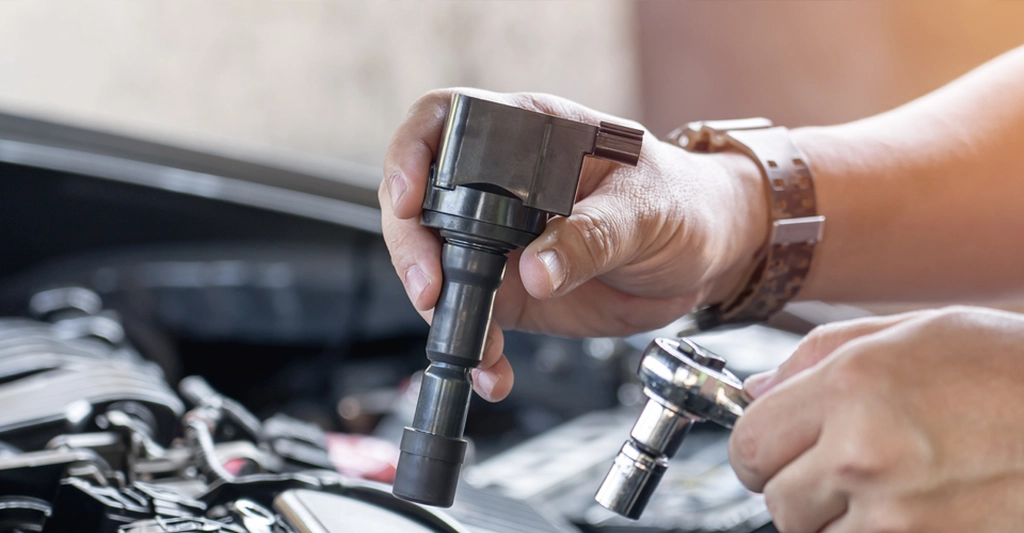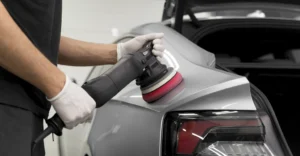If your engine isn’t running quite right shaking, stalling, or guzzling petrol your ignition coil could be to blame. This small but crucial component is what sends high-voltage power to your spark plugs, enabling proper combustion in each cylinder. But when it starts to fail, it can cause a ripple of performance issues, increased emissions, and even damage to your catalytic converter.
In this guide, we’ll walk you through the key symptoms of a failing ignition coil, how to diagnose the issue properly, and what to do next. Whether you’re a DIY enthusiast or simply want to understand your mechanic better, here’s what you need to know.
11 Symptoms of a Failing Ignition Coil
1. Check Engine Light The most common early warning is your check engine light turning on. Faulty ignition coils trigger misfire-related trouble codes (like P0300 series), which your car’s ECU detects and logs. While a CEL doesn’t automatically confirm coil failure, it’s a red flag that something’s off.
2. Engine Misfire When a coil fails to deliver consistent voltage, your engine can misfire. This might feel like sudden jerks, hesitation during acceleration, or a drop in power especially noticeable under load.
3. Rough Idling If your engine shakes or vibrates while idling, it’s likely due to uneven combustion caused by weak or intermittent spark. A bad ignition coil can be a prime suspect.
4. Hard Starts or No Start Cold mornings or wet weather can make starting harder if your ignition coil is weak. In severe cases, the engine won’t start at all due to lack of spark.
5. Poor Petrol Efficiency Unburned fuel from incomplete combustion means your engine works harder and burns more petrol to compensate for the lost power. If you’re noticing shorter distances on the same fuel, this could be why.
6. Sluggish Acceleration Your car might feel like it’s struggling to respond when you hit the accelerator. This is often caused by a lack of proper spark timing and energy classic signs of a bad coil.
7. Engine Stalling A failing ignition coil may only send voltage sporadically, which can lead to random engine stalls especially dangerous if it happens while driving.
8. Increased Exhaust Emissions More unburned fuel in the exhaust results in more emissions. You might even notice a strong petrol smell or see dark smoke from the tailpipe both are indicators of ignition problems.
9. Backfiring When excess unburned fuel enters the exhaust system and ignites, it can cause a loud pop or bang. This isn’t just annoying; it’s a sign of poor combustion and wasted fuel.
10. Overheating Catalytic Converter Continuous misfires from a bad coil can cause the catalytic converter to overheat. Replacing a catalytic converter is expensive, so early coil diagnosis can save you money.
11. Visible Damage on the Coil Sometimes, the signs are physical. Cracks, corrosion, oil contamination, or burnt spots on the coil pack itself suggest it’s time for a replacement.
How to Properly Diagnose a Faulty Ignition Coil
Before replacing any parts, follow this step-by-step process:
Step 1: Scan for Error Codes
Use an OBD-II scanner to check for trouble codes. Codes starting with P0300 indicate random misfires, while P0301–P0306 pinpoint specific cylinders.
Step 2: Visual Inspection
Look for cracked casings, burnt terminals, or oil seepage around the coil. Also inspect the wiring harness for corrosion or damage.
Step 3: Multimeter Test
Set your multimeter to resistance mode (ohms) and measure the coil’s primary and secondary resistance. Compare these with your car’s service manual specs. A reading outside the normal range usually means the coil is bad.
Step 4: Coil Swap Test
If you’re dealing with multiple coils, swap the suspect coil with one from a working cylinder. Clear the error codes and test drive the car. If the misfire follows the coil, you’ve found your culprit.
Should You Replace All Ignition Coils?
Unless you’re experiencing multiple failures or your coils are old and due for replacement, there’s no need to change them all at once. However, if one fails and others are showing wear, it may be cost-effective to replace them together especially in vehicles with coil packs that require more disassembly.
Final Thoughts: Don’t Ignore Ignition Symptoms
A bad ignition coil might seem like a minor issue at first, but ignoring it can lead to poor fuel economy, costly engine damage, and even a failed emissions test. If you notice any of the symptoms above, act quickly.
Whether you’re troubleshooting it yourself or visiting a garage, understanding how ignition coils affect your engine will help you make informed decisions and potentially save money on diagnostics and repairs.
For expert diagnostics, ignition coil replacements, and advanced OBD-II scanning, book your service today with MotorHub. We offer professional automotive care in the UAE and beyond, using certified parts and expert mechanics to keep your car running smoothly.



